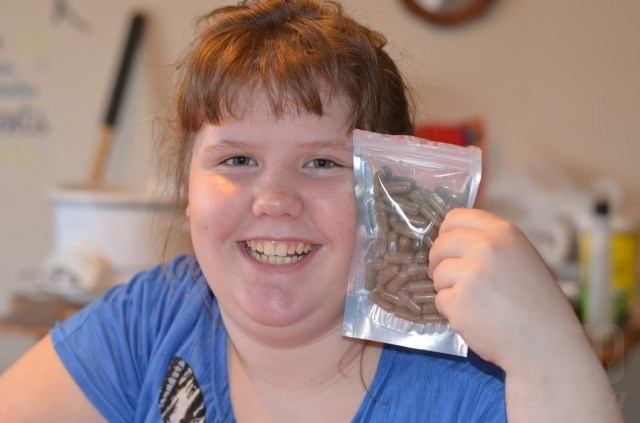
A smiling Tanniel, 13, holds her CBD pills.
(CHARLOTTE HELSTON / iNFOnews.ca)
February 07, 2016 - 12:00 PM
THOMPSON-OKANAGAN - Medical marijuana is fraught with politics, from local police departments warning dispensaries to shut down to Prime Minister Justin Trudeau's promise of legalization.
What's often lost in the noise is the people at the heart of all this: the patients.
In Vernon alone, local dispensaries serve roughly 10,000 patients. Many are reluctant to speak about their experiences because of the stigma attached to marijuana, but we found four individuals from the Okanagan willing to share their experiences with us.
They range from ages 13 to 60. Their medical conditions are as diverse as they are. The one constant between them all is cannabis has worked in ways other medication hasn’t. From stopping a child’s seizures to helping one man get a good night’s sleep, marijuana makes a difference for people.
Here are their stories.
TANNIEL
CONDITION: Non-epileptic seizures
PRODUCT: CBD oil/ capsules
COST: free via sponsorship at MMJ Total Health
“WE HAD TO FIGHT WITH THE SYSTEM TO GET IT”
The first time I see Tanniel have a seizure is at a rally for medical marijuana in Vernon. The seizure consists of a few spastic movements and lasts less than a minute. Her step-dad James holds the 13-year-old to his chest while she seizes, and nonchalantly continues our conversation about their experience with cannabidiol (CBD). This seizure is minor compared to what Tanniel went through before being prescribed medical marijuana in September 2015. Before that, she was having up to 170 seizures a day, and they weren’t short like this one. Her mom Liz watched her daughter seize every day, nearly all day long. Tanniel couldn’t walk because she was constantly seizing and had to be put in a wheel chair. She hated colouring because the seizures made her scribble all over the page. She couldn’t go to the bathroom by herself.
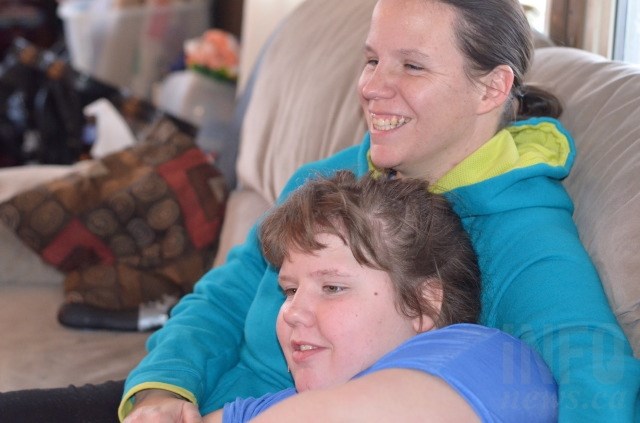
Liz says CBD has allowed Tanniel to live like a normal teenager again.
(CHARLOTTE HELSTON / iNFOnews.ca)
About a month after the rally I meet with Liz and Tanniel at their home in Vernon. Tanniel doesn’t have a single seizure during our visit. She’s down to about 10-20 short seizures a day. Some days, she doesn’t have a single one.
It’s thanks to a drop of CBD oil about the size of a grain of rice taken four times a day on a cracker. Liz smothers the oil in peanut butter to mask the taste, which Tanniel doesn’t much care for. Lately, due to a supply shortage at the dispensary they use — a symptom of recent police warnings — Tanniel has switched to CBD capsules instead. The effect remains the same, however, and that’s all that matters.
“She’s back to enjoying life,” Liz says.
Tanniel’s happy, carefree attitude is evident as she and her mom play a game of King’s Corner at the kitchen table. The card game has them laughing and Tanniel wears a broad grin that suits her young face. It’s a moment they couldn’t have shared before the CBD oil.
“She couldn’t shuffle the cards with her seizures. It would be 52 pick up,” Liz says.
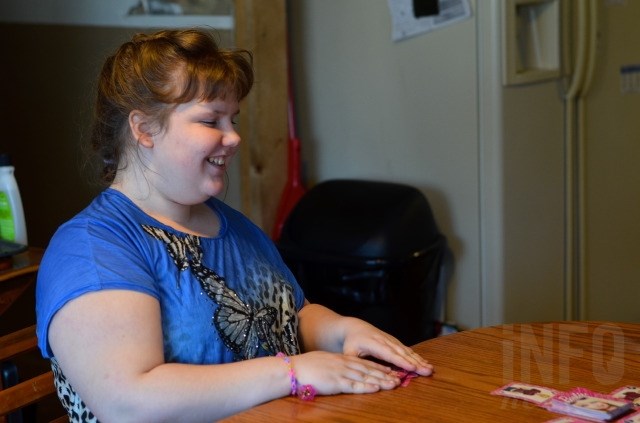
Tanniel plays King's Corner with her mom, Liz.
(CHARLOTTE HELSTON / iNFOnews.ca)
Tanniel started having seizures when she was five-years-old. After numerous emergency trips to B.C. Children’s Hospital, various doctors, tests and medications, Liz started researching medical marijuana and decided it was worth a shot.
“I didn’t have any hopes anymore, if it helped, great. Honestly, I was at the point where I didn’t think anything would help her. It was heartbreaking,” Liz says.
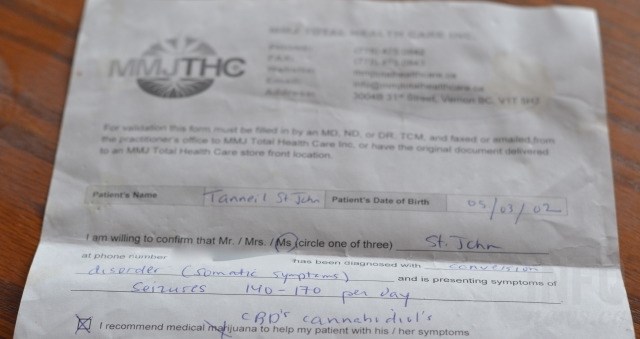
Tanniel's prescription for cannabidiol, the non-psychoative portion of the marijuana plant.
(CHARLOTTE HELSTON / iNFOnews.ca)
It took some time before they found a doctor who would sign off on the prescription, but once they did the results were almost immediate. Unlike THC, cannabidiol doesn’t produce a psychoactive high and has been shown to help with a number of medical conditions including epilepsy, multiple sclerosis and cancer. Liz says it’s been a miracle, and wishes they’d discovered it sooner. Doctors have told her Tanniel’s seizures don’t cause brain damage, but Liz doesn’t believe that.
“She’s changed a lot. We’ve lost a lot of her personality. I don’t know if we’ll ever get that child back,” Liz says. “Sooner would have been a whole lot better (to get CBD). I guarantee we wouldn’t have lost so much of our child as we have already. But we had to fight with the system to get it.”
SIMONE
CONDITION: Lupus
PRODUCT: CBD capsules, lotions
COST: $200 a month
“IT’S MY LITTLE SECRET”
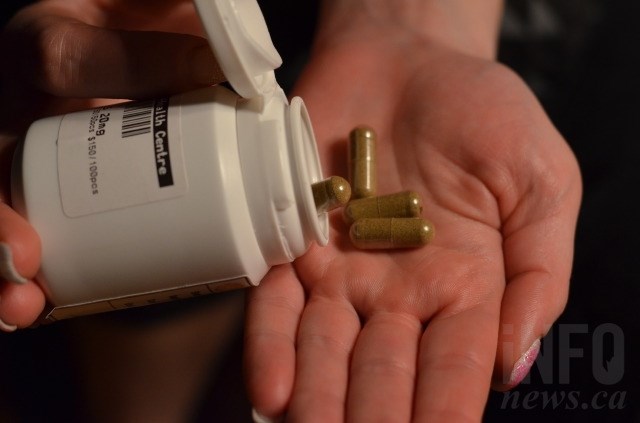
CBD helped reduce inflammation and joint pain for Simone.
(CHARLOTTE HELSTON / iNFOnews.ca)
It’s changed her life, but she doesn’t share the news with many people. Simone, a nurse in her mid-30s who asked me not to use her real name, keeps the drug that lets her eat, exercise and sleep normally again a secret. Only those close to her know medical marijuana is behind the transformation.
About ten years ago, she started losing her hair, suffering joint pain and struggling with chronic fatigue. Eventually, she was diagnosed with Lupus, a disease in which the body’s immune system starts attacking its own tissues and organs. Simone also deals with Sjogren’s syndrome, which affects the mucous membranes and moisture-secreting glands of the eyes and mouth.
About a year ago, she decided to try CBDs with the hope it would soothe her joint pain — which her chemical prescription for Lupus didn’t. Suddenly, she was sleeping better, had more energy, and was no longer in pain.
She did her first trial with marijuana without a prescription, just to see if it would work. When the effects had her going to the gym, able to hike with her dog, and feeling normal again, she approached her doctor about getting a prescription and had no problem obtaining one.
But even though she’s accessing her medicine through legal means, she doesn’t like to talk about it with people. As a nurse, she doesn’t want people to think she’s coming to work high. After getting her prescription, it took her two weeks to find the courage to visit The Herbal Health Centre, afraid of who might see her there.
“It’s my little secret as to why I feel so good,” Simone says. “It’s unfortunate, because I’m not smoking it and I’m not going to work stoned. It’s like taking a multi-vitamin.”
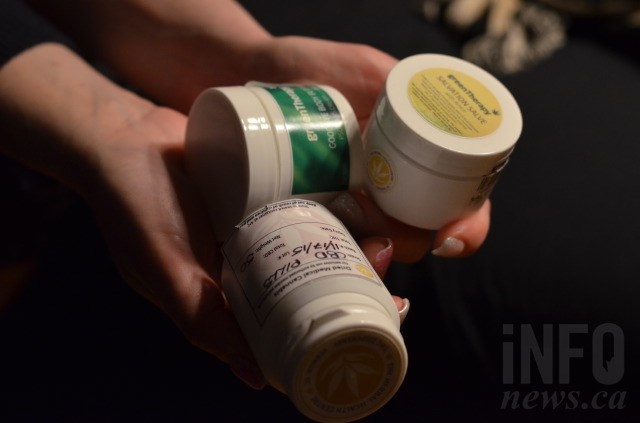
Simone uses CBDs for pain management, and marijuana creams for a skin condition.
(CHARLOTTE HELSTON / iNFOnews.ca)
Since starting her CBD pills, which she takes three times a day, she’s also started using marijuana creams for a skin condition and seen great results.
“My hands looked like ground hamburger. At the end of a few weeks with the lotion they were healed,” she says.
Medical marijuana isn’t typically covered by health insurance, which means Simone has to pay $200 a month for it out of pocket. It’s something she’d like to see changed, but as she says, ‘I can’t put a price tag on my health.’
Medical marijuana hasn’t cured her. She’ll have Lupus for the rest of her life. But it’s given her a way back to a life she never thought she would have again.
“It’s a comfort to know I can lead a normal life. Five years ago, I was a victim of my illness. Now it doesn’t define me, it’s just part of life.”
EDWARD
CONDITION: Multiple sclerosis
PRODUCT: Edibles
COST: $7 a week
“I GOT A LOT OF FRIENDS THAT THINK IT’S THE BEES-KNEES”
One lemon drop cookie lasts Edward an entire week. He divides the baked good into loonie-sized pieces, which he eats before going to bed at night to help him sleep. One cookie costs $7.
“It’s a bargain, man,” he says.
He casually offers me a bite, but I decline on account of the 200 mg of high potency cannabis oil infused in it. Although, the cookie does look good.
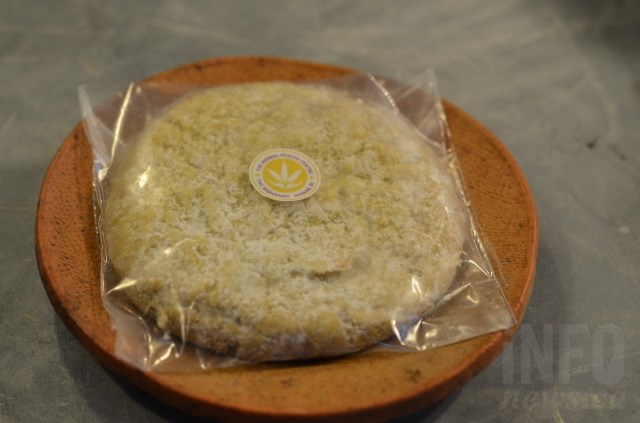
Edward eats a bite of these lemon drop cookies before bed and it helps him sleep.
(CHARLOTTE HELSTON / iNFOnews.ca)
Now in his 60s, Edward (not his real name) was diagnosed with Multiple Sclerosis about 15 years ago. Believed to be an autoimmune disease, MS attacks the nervous system and leads to weakness, lack of coordination, and impaired sensation, among other symptoms. Life with MS isn’t easy, and a having a good night’s sleep makes a huge difference in Edward’s day-to-day life. Without that bite-sized lemon drop, finding sleep is a battle.
“I get burning sensations — zingy, hot nerve pain — in my legs and calves. I have spasms. I lay in bed and go like this,” he says, twitching his limbs.
About ten years ago, he started getting edibles from a friend. Back then, it was frozen cookie dough, not lemon drops, that provided him relief. When medical marijuana came online, he approached his doctor about getting it legally. Easily enough, he obtained a prescription and headed to a local dispensary. He had no interest in Health Canada’s mail-order system, which he says seemed ‘complicated, bizarre and expensive.’
He keeps his cookies in the freezer so they stay fresh and visits the dispensary about once a month. He readily admits his confectionary cannabis is more than just medicine.
“I think it’s an emotional, creative medicine. I really enjoy it. I have great insights when I take it,” he says, adding he needs to write them down more.
He doesn’t think he’s alone in appreciating marijuana’s blend of medicinal, and recreational attributes. He’s watched conversations between staff and patients at the dispensary blur the line between medicine and pleasure.
“They start talking about it like it’s wine, opening and smelling the jars, talking about different names and strains. The customers are like reviewers. It’s like a wine shop,” he says.
And while we’ve all heard how indulgences like wine and dark chocolate can be good for you in moderation, marijuana buries them in terms of health benefits, he says.
“I got a lot of friends who think it’s the bees-knees, and I think it well might be,” Edward says. “I know people whose kid was suicidal and they tried the oils and the kid is doing great. The parents are crying their eyes out because the kid is doing fantastically better.”
As a patient and a parent himself, he’s torn. He doesn’t want his own kids to smoke marijuana, and hides his cookies deep in the freezer. But he’s seen how it can help people, himself included. There isn’t a cure for MS. Eventually, he won’t be able to walk. He’s already contemplated the possibility of assisted suicide.
So, he’ll keep indulging his sweet tooth because it makes life a little better.
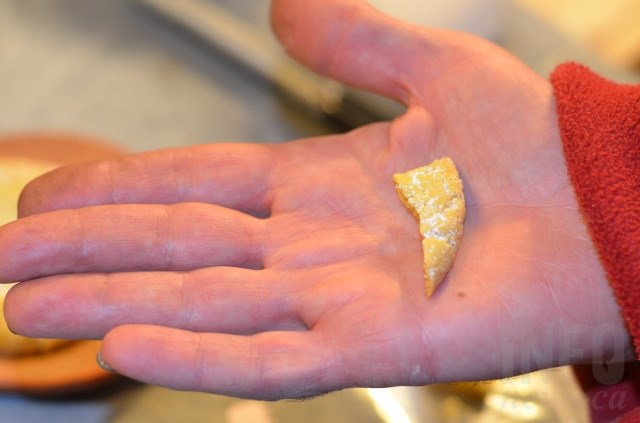
Edibles help Edward with pain management and sleep, but he also enjoys the high he gets from taking them.
(CHARLOTTE HELSTON / iNFOnews.ca)
DREW
CONDITION: Schizophrenia
PRODUCT: CBD capsules
COST: $100 a month
“IT’S BEEN TRANSFORMATIVE”
You can’t see Drew’s condition. He doesn’t have seizures, doesn’t walk with a limp. His is a mental illness, but like the others described in this series, medical marijuana is playing a role in his health.
Diagnosed with schizophrenia in 2004, the now 32-year-old calls himself a work in progress. He lives in a subsidized housing complex provided by the Canadian Mental Health Association, which is where we meet. On limited income, he can’t afford to go out for a coffee.
“CBD has been nothing but positive, really,” Drew says.
He takes non-psychoactive CBD capsules, which don’t produce a high. No stranger to marijuana — he’s smoked it recreationally for much of his life — Drew says he started looking into the medicinal properties just over a year ago. Mental health disorders such as schizophrenia are among the conditions Health Canada advises not using cannabis for, however a simple Google search reveals many people disagree. Cannibidiol is touted in various online articles and studies as having anti-psychotic effects useful in the treatment of schizophrenia. A doctor agreed it was worth a shot for Drew, and wrote him a prescription.
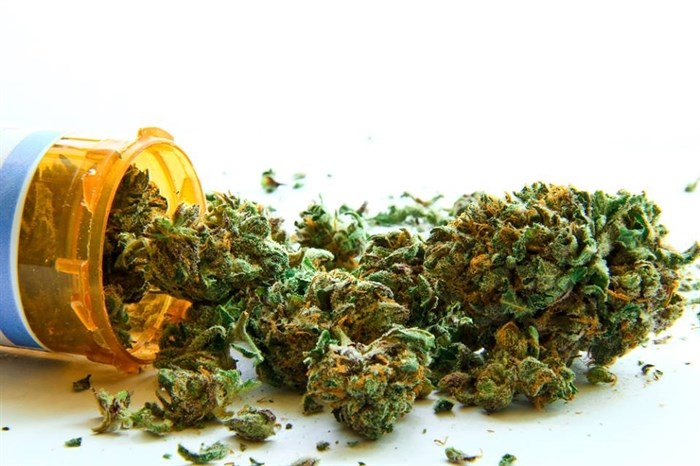
Image Credit: Shutterstock
Contrary to what many believe, Drew says his medical marijuana has a very sobering effect on his mental state.
“For myself personally, it helps with disorganized thoughts. When I ingest CBD, I want to get things done,” Drew says.
He still takes an anti-psychotic medication prescribed by his doctor, and admits without it, he’d probably be back in the psych ward. He says he tries hard to listen to his doctor and follow her instructions for treatment closely. So far, it’s working, although he says he doesn’t push the drug on anyone else.
“I can only speak for myself,” he says. “It’s so individual how it (marijuana) reacts with your body chemistry.”
He usually takes four CBD capsules a day. Each pill costs $3. He’s purchased marijuana on the street before, but likes shopping at the dispensary instead because he knows what he’s getting.
“Compared with street drugs being laced with something else,” he says. “I know the dispensary will give me something that does not have other things that are detrimental to my health and addicting. I know I’m not putting myself in jeopardy.”
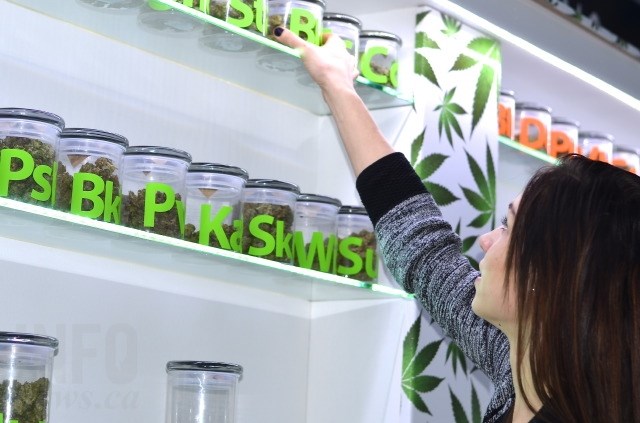
Hasia Glaim at MMJ Total Health Care on 31 Street downtown Vernon.
(CHARLOTTE HELSTON / iNFOnews.ca)
While smoking marijuana recreationally has been a lifestyle choice for him in the past, he’s considering quitting and just taking the CBDs. He thinks of cannibidiol as a supplement to himself, a catalyst that allows him to live his life more fully.
“CBDs have been transformative,” he says, searching for the right words. “It’s so hard to describe, which is why I’m silent.”
He sits quietly, roaming his mind for an accurate description.
“It provides me with solace,” he says finally.
To contact a reporter for this story, email Charlotte Helston at chelston@infonews.ca or call 250-309-5230. To contact the editor, email mjones@infonews.ca or call 250-718-2724.
News from © iNFOnews, 2016